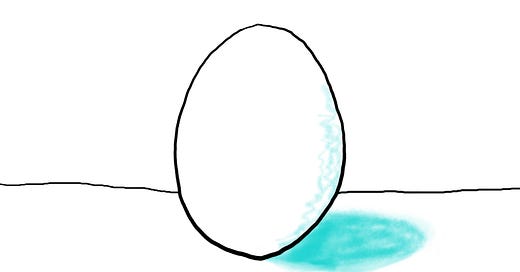Did you know that in France, people only ever eat one egg for breakfast?
It’s because in France, one egg is enough.
I love jokes. I like them for the imagination, for the storytelling, and of course, for the laughs. I like how people bond when they share them. I don’t always get ’em, though. Does anyone?
The joke above is one of my all-time favorites. Most people completely miss it, but when you hit the right audience, it’s killer-diller. The secret: the way to say “one egg” in French is “un oeuf,” which can be pronounced almost exactly like the English word “enough.” Thus, “one egg = enough.”
Try this joke out in a conversation that’s already touched on France, the French language, or where at least one of the participants is French. Lay it out deadpan, like you’re perfectly serious, one egg is enough for French people. You’ll touch a nerve for many folks, 95% of whom won’t even realize that it’s a joke in the first place.
“Insufficient,” someone will say, with a frown.
“I don’t feel like it’s even true,” a French friend will respond. “I’m from Marseilles, and I sometimes eat three eggs for breakfast!”
This joke is a beautiful exercise in internal validation. It’s clever as fuck, and nobody else has to tell you that it is for you to enjoy it yourself. If you’re a mischievous type, you might just sit there and shrug. “That’s what I heard,” you’ll say. “One egg is enough.”
If you’re feeling generous, you might alter the pronunciation slightly, putting a twinkle in your eye: “unnuff.” That’s how a Frenchster would actually say it, after all. Gradually it will dawn on one or more of the participants, and smiles will blossom. “Ahh, I get it,” they’ll grin. “Un oeuf. Mm hmm.” They’ll nod, or even slowly shake their head, with sly approval.
Here’s why: non-obvious jokes are an especially satisfying category of jokes. Jokes like this one make people feel smart when they burst through the fog of obscurity and into the delightful light of figured-out problems. They’ll like you, too, because they know that they’re constantly becoming the average of the five people they spend the most time with, and you’re funny.
Especially when you’re not thirsty for validation.
When I was a kid, I was chided for requesting explanations of jokes I didn’t get. “If you have to explain it, it’s not funny anymore,” most people told me. This added to the bafflement. Didn’t anyone else care what was actually going on? Jokes held wisdom about the world, psychology, how to be in right relationship with ourselves and each other. I was eternally grateful to anyone who took the time to walk me around the block on one.
Today, as an adult who loves writing, it gives me great joy to thoroughly explain jokes on this Substack (and to have written this book about them!). I hope it can be of some value to you. Regardless, know that for me, the process of creating it is one egg all on its own.
###




